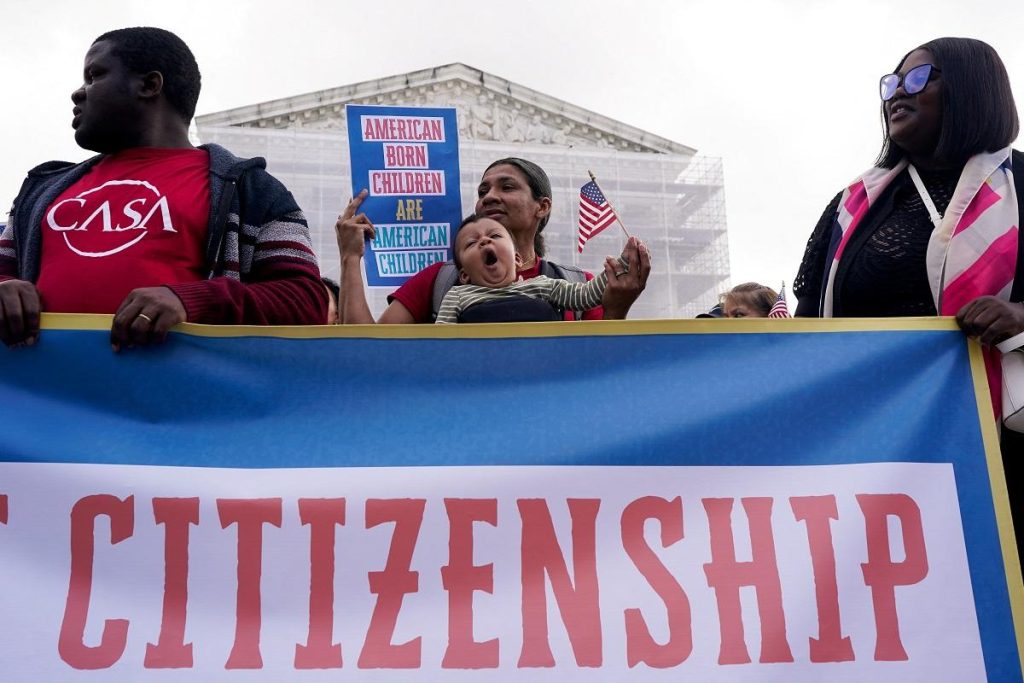The U.S. Supreme Court is currently evaluating a controversial executive order introduced by former President Donald Trump, which seeks to limit the automatic right to citizenship for children born in the United States. The measure aims to reinterpret the 14th Amendment, and its outcome could redefine how citizenship is granted in the country.
What the Executive Order Proposes
The directive, known as Executive Order 14160, was signed by Trump on his first day back in office in January 2025. It attempts to prevent the children of undocumented immigrants and those on temporary visas from gaining U.S. citizenship at birth. Trump’s administration argues that the 14th Amendment’s intent was never to include children of individuals not legally residing in the U.S., particularly those who are not fully subject to its jurisdiction. According to the order, the original purpose of the amendment was to address the status of formerly enslaved people—not to extend citizenship to the children of foreign nationals.
Immediate Legal Pushback
Following the announcement, several lawsuits were filed by states and civil rights organizations. Federal courts in states like Maryland and Massachusetts issued nationwide orders to block the implementation of the policy, citing it as unconstitutional. The judges referenced the landmark 1898 Supreme Court ruling in United States v. Wong Kim Ark, which upheld that nearly all individuals born on U.S. soil are entitled to citizenship, regardless of their parents’ immigration status.
The administration appealed these rulings, asking the Supreme Court not only to allow the executive order to proceed but also to address the broader issue of whether lower courts should be able to issue sweeping nationwide injunctions that halt federal policies.
Key Arguments Before the Court
During the recent Supreme Court session, liberal justices voiced strong opposition to Trump’s order. Justice Sonia Sotomayor, for example, highlighted the risk of creating a population of stateless children and the chaos that could follow from inconsistent application of citizenship rules across different states.
Conservative justices, meanwhile, appeared more concerned about the use of broad judicial power. Justice Brett Kavanaugh questioned whether class-action lawsuits might be a better tool for addressing disputes over federal actions than allowing individual judges to issue nationwide bans.
The Justice Department, representing the Trump administration, maintained that the president has the authority to interpret and implement constitutional principles, and that the courts should not obstruct that authority through wide-ranging injunctions.
Broader Impact and Legal Stakes
The Supreme Court’s ruling could dramatically affect the future of birthright citizenship. If the justices permit the policy to go forward, it may lead to the denial of automatic citizenship to over 250,000 children born annually to parents who are not U.S. citizens or permanent residents.
Beyond immigration, the decision could set a precedent for how much power federal judges have to stop executive policies from being enacted on a nationwide scale. A ruling in Trump’s favor could make it harder for future plaintiffs to challenge controversial policies outside of the jurisdictions where cases are originally filed.
Awaiting a Landmark Decision
The nation now waits for the Court’s verdict, expected by July 2025. The outcome has the potential to reshape not only immigration and citizenship laws but also the long-standing balance of power between the executive and judicial branches of government.
Whatever the decision, it is likely to fuel ongoing political and legal debate over how the Constitution is interpreted in a modern context and the extent to which presidential authority can influence fundamental rights such as citizenship.





More Stories
U.S. Congress Warns Trump: Tariffs on India Risk Strategic Partnership
Under‑Construction Tower Collapses in Chennai, Nine Missing After Disaster
From Ice Stupas to Isolation: Sonam Wangchuk Detained Amid Ladakh Turmoil